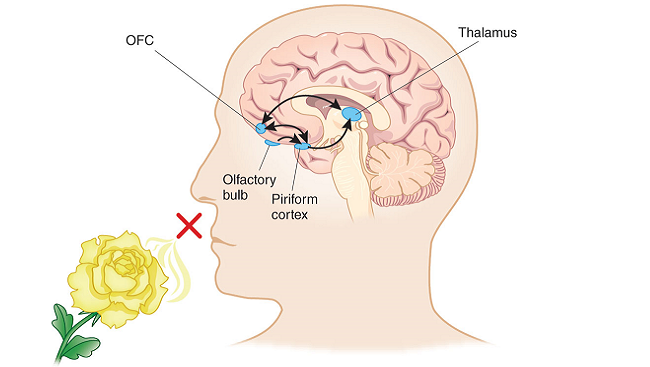
Scent Hacking: How Smells Prime Your Brain for Performance or Panic
Smell is more than just a background sense — it’s a direct line to your brain’s emotional and survival centers. While most people think of scent as a matter of preference or ambiance, it actually shapes your stress levels, alertness, memory, and even how well you focus.
Whether it’s the calming drift of lavender, the zing of peppermint, or the panic-inducing scent of smoke, your nose is constantly sending messages to your nervous system — often before you’re even conscious of it (Hoult et al., 2019).
Once you understand how scent affects your brain and physiology, you can use it with intention — to shift mood, sharpen concentration, or down-regulate anxiety in seconds.
Why Smell Affects the Brain So Powerfully
Unlike your other senses, smell takes a shortcut. Scents bypass the thinking brain and plug directly into the limbic system — the part that controls emotion, memory, and instinct (Moss et al., 2012). That’s why scent can instantly change your mood or bring back a memory from childhood with crystal clarity. It’s not subtle. It’s primal.
What Scent Does Inside the Brain:
- Triggers emotional states: Certain smells stimulate the amygdala and hypothalamus, changing your stress or relaxation level within moments (Verywell Mind, 2021).
- Alters cognitive performance: Energizing scents like rosemary and citrus can improve alertness and working memory. Calming scents like lavender reduce sympathetic nervous activity.
- Shapes perception of safety or danger: Your brain associates certain smells with threat or comfort, which can raise or lower your baseline anxiety without your awareness.
This isn’t aromatherapy fluff — it’s sensory neuroscience. You’re breathing in neurological commands all day long.

Scents That Activate Focus vs. Panic
The right scent can prime you for flow and productivity. The wrong one can unknowingly keep your system in a low-grade state of threat.
Here’s how it plays out:
Scents that enhance performance
- Peppermint: Increases alertness and reduces mental fatigue
- Rosemary: Improves memory and cognitive speed (Moss et al., 2012)
- Citrus oils (lemon, orange): Stimulate energy and mood
Scents that promote calm
- Lavender: Lowers blood pressure and cortisol (Moss et al., 2012)
- Sandalwood: Calms the nervous system and supports emotional grounding
- Vanilla: Reduces anxiety and promotes feelings of safety
Scents that spike stress
- Bleach, synthetic perfumes, or “chemical” odors: Can activate threat detection systems in the brain, increasing baseline cortisol or tension
- Smoke, spoiled food, or moldy environments: Even at low levels, these smells can trigger subconscious vigilance and restlessness
Smell can lift you or agitate you. Knowing which direction you're being nudged is key.
The Science Behind It
Smell travels via the olfactory nerve, which is directly connected to the limbic system — especially the amygdala and hippocampus. That’s why it influences both emotional state and memory storage so powerfully.
Studies show that scent affects:
- Brain wave patterns: Lavender increases alpha waves (associated with relaxation), while peppermint increases beta waves. This is linked to focus and alertness (IUeMag, 2023)
- Stress biomarkers: Inhaling certain essential oils reduces heart rate variability and serum cortisol in high-stress individuals
- Cognitive speed: Aromas like rosemary and lemon have been shown to improve reaction time and memory recall in human trials
Smell doesn’t just change how you feel — it changes how your brain fires.
How to Use Scent Intentionally
Scent hacking is simple and low-effort. You don’t need diffusers or candles. Just a few drops of essential oil, a roller, or even exposure to natural herbs can shift your mental state fast.
Start here:
- Pick your scent based on your goal: Use peppermint or lemon for a workday pick-me-up. Use lavender or vanilla before sleep or during stress.
- Anchor it to a task: Use the same scent every time you focus, rest, or prep for sleep. Over time, your brain builds an association and responds faster.
- Use real, clean sources: Avoid synthetic fragrances. Use high-quality essential oils or dried herbs to avoid activating unwanted chemical responses.
- Limit exposure: A small whiff is enough. Overuse can desensitize your system and reduce the impact.

Scent vs. Silence: Key Differences
- Smell provides subconscious emotional input. Silence does not.
- Scent changes nervous system tone in seconds. Breathwork takes minutes.
- Scents can anchor habits automatically. Mental focus alone takes effort.
- You can smell passively and still benefit. Meditation requires active attention.
This doesn’t mean scent is a replacement for breathwork or mindfulness — but it’s one of the fastest tools you can use when your brain is stuck in the wrong gear.
One Simple Cue
If your brain feels foggy, tense, or disconnected — check what you're breathing in.
References:
Hoult, L., Longstaff, L., & Moss, M. (2019). Prolonged low-level exposure to the aroma of peppermint essential oil enhances aspects of cognition and mood in healthy adults. American Journal of Plant Sciences, 10(6), 1002–1012. https://doi.org/10.4236/ajps.2019.106073
IUeMag. (2023). Aromatherapy and brain chemistry: How aromatherapy can transform your mood and mental state. IUeMag. Retrieved July 16, 2025, from https://www.iuemag.com/inspi-news/inspi-writes/aromatherapy-and-brain-chemistry
Moss, M., Cook, J., Wesnes, K., & Duckett, P. (2012). Aromas of rosemary and lavender essential oils differentially affect cognition and mood in healthy adults. Therapeutic Advances in Psychopharmacology, 2(3), 103–113. https://doi.org/10.1177/2045125312436573
Verywell Mind. (2021). Why we associate memories so strongly with specific smells. Verywell Mind. Retrieved July 16, 2025, from https://www.verywellmind.com/why-do-we-associate-memories-so-strongly-with-specific-smells-5203963












.jpeg)

.jpg)




